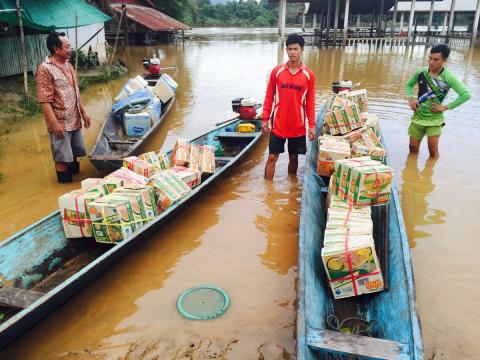Laos flooding -10 villages underwater, World Vision responding

World Vision Lao responding to flooding in central area of the country.
6 August 2015
World Vision is responding to flooding in Bolikhamxay province, distributing food and clean water to more than 6,300 people who have seen water pour into their homes.
The flooding began on Sunday evening, 2 August 2015, after several days of heavy rain. An estimated 10 villages have been affected – with 1,238 households in the flooded area.
Homes have been inundated with water, schools closed, and rice fields destroyed. Families are now travelling by boat, instead of road.
More rain has continued since then, and more rain is predicted in the days to come.
No human causalities have been reported although many have abandoned their homes, and many households are totally submerged. Families are seeking shelter in schools and district government offices, where they are waiting out the flood.
Two of World Vision’s projects are affected: Bolikhan and Paksan. It’s estimated about 379 registered children in our sponsorship programme have been affected by the flooding as well.
To respond, World Vision has partnered with the district government authority to distribute canned fish, noodles, and clean water.
Looking further down the road, World Vision is concerned about flooding that has destroyed many rice fields in these areas. Livestock has been lost as well; however, exact numbers are not available. Many families here live on subsistence farming and loss of agricultural crops or livestock can push already-impoverished families further into poverty and affect household food security.
World Vision's Response Plan:
Distribute food items to 10 villages.The food items for each household include:
- 1 pack of fish cans (5 cans),
- 3 bottles of water (4 litre)
- 1 box of noodles (30 packs)
The response team consists of World Vision staff and district government staff. Boats and big trucks from the district army are transporting the relief items to the villages.